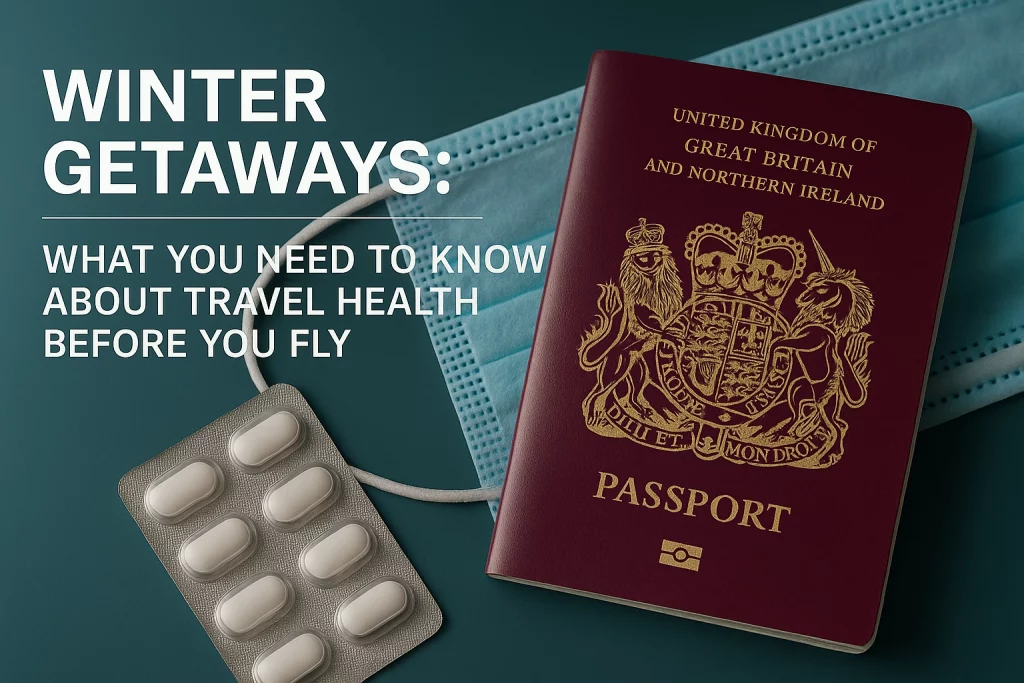Planning a winter escape to sunnier skies? Whether you’re swapping rainy mornings for Thai beaches, booking all-inclusive resorts in Egypt, or chasing Caribbean sunsets, don’t forget one key part of your holiday checklist: your health.
Winter is peak season for travel to warmer destinations, and with it comes a unique set of health risks. The last thing you want on holiday is food poisoning, jet lag that ruins your sleep, or a mosquito bite that sends you home with more than memories.
Here’s what you need to know before you take off.
Table of Contents
1. What Are the Most Common Travel Health Issues in Winter?
Travelling in winter doesn’t mean fewer health risks. It just means different ones. Popular warm-weather destinations often have different food hygiene standards, insect-borne illnesses, and climate challenges that your body isn’t used to.
Common travel-related health issues:
- Traveller’s diarrhoea (especially in parts of Asia, Africa and Latin America)
- Jet lag and poor sleep in new time zones
- Mosquito-borne illnesses like dengue or malaria
- Sunburn and dehydration
- Respiratory issues if going from cold, dry air to hot, humid conditions
2. Where Are You Going? Location Matters
Different countries have different risks. A trip to Thailand isn’t the same as a week in Dubai.
| Destination | Health Considerations |
|---|---|
| Thailand / Vietnam / Bali | Hepatitis A, food hygiene, dengue fever, travel sickness |
| Egypt / Morocco | Typhoid, Hepatitis A, heat sensitivity, food-borne illness |
| Caribbean Islands | Mosquito protection, Hepatitis B, safe food and water |
| Dubai / UAE | Sun protection, staying hydrated, gut sensitivity to local food |
Each location has unique travel health advice, which is why a personalised consultation is important.
3. Vaccines and Medications: What You Might Need
You may need travel vaccinations or malaria tablets based on your destination. Some are required for entry, others are strongly recommended.
Common vaccines for winter travel:
- Hepatitis A
- Typhoid
- Tetanus, Diphtheria and Polio (combined booster)
- Rabies (for longer rural stays or animal contact)
- Yellow Fever (required for some parts of Africa and South America)
Medications to consider:
- Malaria tablets (if recommended for your destination)
- Antibiotics for traveller’s diarrhoea (in higher-risk regions)
- Motion sickness tablets for boat trips or long drives
- Altitude sickness prevention (if hiking or visiting high-altitude areas)
A personalised travel health consultation can help you find out exactly what you need based on your plans.
4. What About the Winter-to-Summer Body Shock?
Going from freezing temperatures to tropical heat can leave your body struggling to keep up.
Tips for adjusting quickly:
- Hydrate well before and during your flight
- Use SPF daily, even if it’s cloudy
- Ease into new foods and portion sizes
- Avoid drinking tap water unless verified safe
- Pack lightweight, breathable clothing, but bring a jumper for the flight
5. Don’t Forget These Essentials
Whether you’re travelling for 5 days or 5 weeks, pack a small medical kit to avoid stressful pharmacy visits abroad.
Smart items to bring:
- Oral rehydration salts
- Anti-diarrhoea tablets
- Insect repellent with 50% DEET
- Antihistamines (for allergies or bites)
- Paracetamol or ibuprofen
- Hand sanitiser and antibacterial wipes
- Any personal prescriptions, clearly labelled
If you take regular medication, make sure to bring enough for your trip and check that it’s legal in your destination country.
6. Get Ahead of Jet Lag and Fatigue
Crossing time zones can disrupt sleep, energy, and digestion. To reduce the effects of jet lag:
- Start adjusting your sleep schedule a few days before travel
- Avoid caffeine close to bedtime
- Try natural melatonin (if approved by your clinician)
- Get daylight exposure as soon as you arrive
- Stay active on the plane and walk every couple of hours
Planning a Trip This Winter?
You don’t have to guess what vaccines, tablets or advice you might need. A travel health consultation tailored to your destination and health profile can help you prepare confidently.

